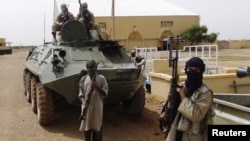The world is at a pivotal moment in the fight against violent extremism, said U.S. Deputy Secretary William Burns at the Global Counterterrorism Forum. As a result of international cooperation, al-Qaida is finding it more difficult to raise money, train recruits, and plan attacks outside the region.
Its leadership has been dealt serious blows. In Yemen, al-Qaida affiliates now hold little ground. And in Somalia, al-Shabaab has gone from controlling most of the country's south and central regions and most of Mogadishu to scrambling for places to operate.
But serious threats remain. In the Sahel and the Horn of Africa, groups are using terror to advance their agendas. For some time, al-Qaida in the Islamic Maghreb has launched attacks and kidnappings from northern Mali into neighboring countries. As violent extremists carve out a larger safe haven, they seek to extend their reach and networks in multiple directions.
The goal now, said Deputy Secretary Burns, is to stay ahead of these threats as they evolve and to put into place long-term solutions that prevent the radicalization of individuals. The best way for governments to do that is through approaches that are grounded in the rule of law and respect for human rights – by reforming law enforcement and criminal justice systems, engaging with local communities, and empowering civil society.
The Global Counterterrorism Forum is already working alongside established partnerships in Africa and Southeast Asia. The Sahel Working group, for example, has brought together senior policy makers from across the region to focus on border security and develop best practices for criminal justice.
Two training centers have been planned in order to counter global terrorism and the ideologies that fuel it. The first in the United Arab Emirates, will train police, educators, and religious and community leaders. A second facility is scheduled to open in Tunis this time next year and is aimed at helping investigators, prosecutors, and others develop rule of law-based tools to prevent and respond to terrorism.
The United States remains committed to the Global Counterterrorism Forum -- a critical effort in the war on violent extremism.
Its leadership has been dealt serious blows. In Yemen, al-Qaida affiliates now hold little ground. And in Somalia, al-Shabaab has gone from controlling most of the country's south and central regions and most of Mogadishu to scrambling for places to operate.
But serious threats remain. In the Sahel and the Horn of Africa, groups are using terror to advance their agendas. For some time, al-Qaida in the Islamic Maghreb has launched attacks and kidnappings from northern Mali into neighboring countries. As violent extremists carve out a larger safe haven, they seek to extend their reach and networks in multiple directions.
The goal now, said Deputy Secretary Burns, is to stay ahead of these threats as they evolve and to put into place long-term solutions that prevent the radicalization of individuals. The best way for governments to do that is through approaches that are grounded in the rule of law and respect for human rights – by reforming law enforcement and criminal justice systems, engaging with local communities, and empowering civil society.
The Global Counterterrorism Forum is already working alongside established partnerships in Africa and Southeast Asia. The Sahel Working group, for example, has brought together senior policy makers from across the region to focus on border security and develop best practices for criminal justice.
Two training centers have been planned in order to counter global terrorism and the ideologies that fuel it. The first in the United Arab Emirates, will train police, educators, and religious and community leaders. A second facility is scheduled to open in Tunis this time next year and is aimed at helping investigators, prosecutors, and others develop rule of law-based tools to prevent and respond to terrorism.
The United States remains committed to the Global Counterterrorism Forum -- a critical effort in the war on violent extremism.






